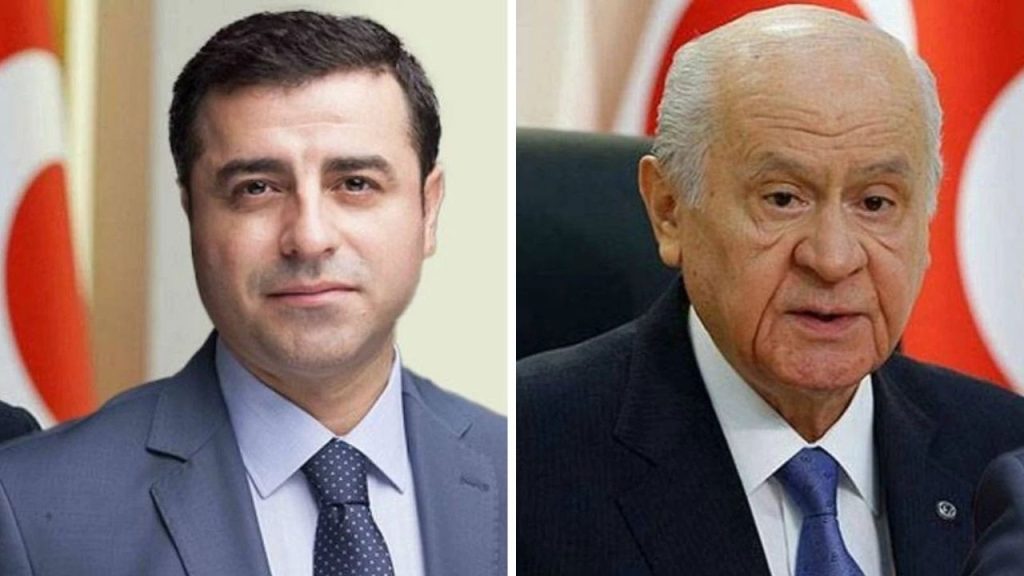In a significant political development, the leader of the Nationalist Movement Party (MHP), Devlet Bahçeli, has reached out to several prominent Kurdish politicians following a recent call from the jailed leader of the Kurdistan Workers’ Party (PKK), Abdullah Öcalan, urging the organization to disarm and disband. This unexpected communication from Bahçeli has sparked discussions about potential shifts in the political landscape concerning the long-standing Kurdish issue in Turkey. The situation escalated when the PKK responded to Öcalan’s call with a ceasefire declaration against Turkey, marking a pivotal moment in the ongoing dialogue about peace and reconciliation.
| Article Subheadings |
|---|
| 1) Overview of Abdullah Öcalan’s Call to Disarm |
| 2) Responses from the PKK and Kurdish Politicians |
| 3) Historical Context of the Conflict |
| 4) The Role of Devlet Bahçeli in the Peace Process |
| 5) Implications for Turkey’s Political Future |
Overview of Abdullah Öcalan’s Call to Disarm
On February 27, 2024, the imprisoned leader of the PKK, Abdullah Öcalan, made a significant appeal for his organization to disarm and dissolve. He emphasized the need for the PKK to pursue a path of democratic consensus rather than the previously favored separatist agendas, stating that various forms of statehood or autonomy had failed to address the historical and societal realities in Turkey. Öcalan’s call for disarmament coincided with the evolving dynamics in Turkish politics, particularly concerning Kurdish rights and representation. By advocating for the PKK to dissolve, he appears to signal an intent to lay the groundwork for a more peaceful coexistence amid ongoing internal conflicts.
Responses from the PKK and Kurdish Politicians
Following Öcalan’s remarks, the PKK announced on March 1, 2024, a ceasefire against Turkey, marking a crucial moment of potential de-escalation in hostilities. This decision illustrates the ongoing struggle of various factions within the Kurdish political sphere to respond to the changing political winds. Many prominent Kurdish politicians, such as Pervin Buldan, co-chair of the pro-Kurdish Democracy and Progress Party (DEVA), and former Peoples’ Democratic Party (HDP) co-chair Selahattin Demirtaş, acknowledged the transformative implications of Öcalan’s call. The dialogues initiated between Bahçeli and key Kurdish leaders signify a possible thawing of relations, as they cautiously explore avenues for cooperation amid longstanding animosities.
Historical Context of the Conflict
The historical context of the Kurdish struggle in Turkey is complex, marked by decades of conflict between the Turkish state and Kurdish nationalist movements. Since the PKK was founded in 1978, it has aimed to promote the rights and autonomy of the Kurdish population in Turkey, often through armed resistance. The Turkish government has maintained a steadfast opposition to the PKK, which it considers a terrorist organization. Öcalan, who was captured in 1999 and has been imprisoned on İmralı Island ever since, has been a pivotal figure in these conflicts. His shift towards advocating for peace and political discourse signals a potential redirection from violent insurgency to negotiation, reflecting broader changes in societal attitudes towards Kurdish issues.
The Role of Devlet Bahçeli in the Peace Process
Devlet Bahçeli, as the leader of the MHP and a key political figure in Turkey, has historically taken a hardline stance against Kurdish political movements. However, recent developments suggest a surprising willingness on his part to engage with Kurdish representatives. After Öcalan’s call for disarmament, Bahçeli reached out to various Kurdish politicians, including Ahmet Türk, and expressed sentiments of hope for peace. His calls for Öcalan to formally announce the dissolution of the PKK in Parliament could mark an unprecedented shift in the MHP’s approach to Kurdish issues. Bahçeli’s involvement might indicate a new governance strategy that prioritizes reconciliation, influenced by broader political pressures and public sentiment for peace.
Implications for Turkey’s Political Future
The unfolding events surrounding Bahçeli and Öcalan’s exchanges indicate potentially significant implications for Turkey’s political landscape. Negotiations and dialogue between previously opposing factions provide a unique opportunity to forge a new political identity for the Kurdish population within Turkey. If these discussions lead to tangible outcomes, it could enhance stability in the region and alter the traditional power dynamics that have governed Turkish politics for decades. Moreover, the evolving situation presents an opportunity for the Turkish government to address broader social issues experienced by the Kurdish community, potentially paving the way for reforms aimed at greater equality.
| No. | Key Points |
|---|---|
| 1 | Öcalan called for the PKK to disarm and dissolve, advocating for democratic consensus. |
| 2 | The PKK announced a ceasefire against Turkey in response to Öcalan’s call. |
| 3 | Devlet Bahçeli reached out to key Kurdish politicians following Öcalan’s appeal. |
| 4 | Bahçeli’s change in tone indicates a potential shift in MHP’s approach to Kurdish issues. |
| 5 | The evolving situation may reshape Turkey’s political future and enhance Kurdish rights. |
Summary
The recent diplomatic overtures between Bahçeli and Kurdish leaders, catalyzed by Öcalan’s call for disarmament, signify a turning point in Turkey’s long-standing Kurdish conflict. This exchange may pave the way for a new approach to Kurdish rights and representation in Turkey’s political landscape. As the situation continues to unfold, the potential for reconciliation and peace-building highlights the ongoing struggle within the country to address historical grievances and promote social cohesion.
Frequently Asked Questions
Question: What was Abdullah Öcalan’s main message in his recent call?
Öcalan called on the PKK to disarm and dissolve, urging the group to seek democratic solutions instead of pursuing separatist agendas.
Question: How did the PKK respond to Öcalan’s call for disarmament?
The PKK announced a ceasefire against Turkey shortly after Öcalan’s call, marking a significant moment for potential peace negotiations.
Question: What role does Devlet Bahçeli play in the current situation?
Bahçeli, the leader of the MHP, has reached out to Kurdish politicians to discuss potential reconciliation efforts, suggesting a potential shift in the MHP’s historic stance against Kurdish movements.


